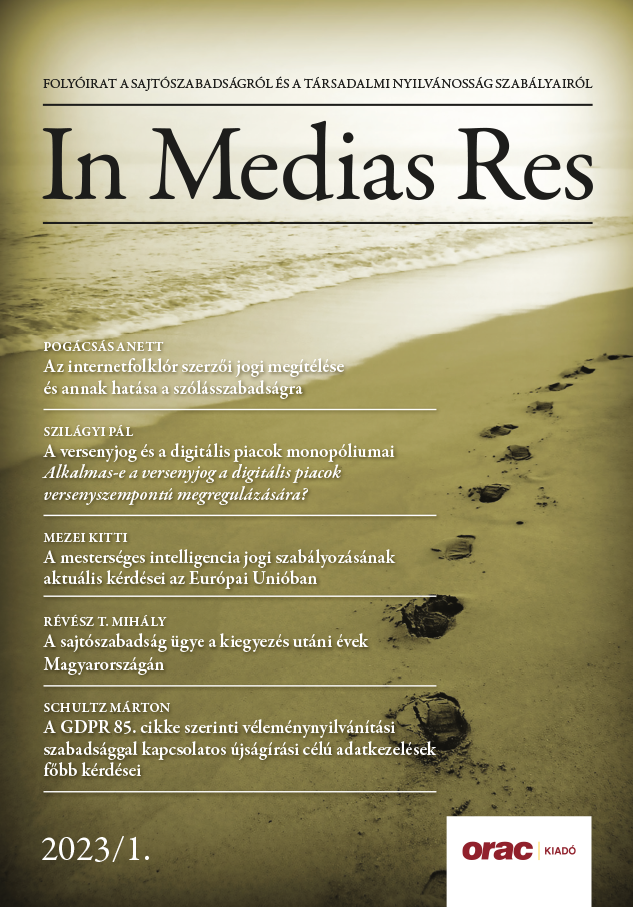Main issues regarding the processing of data for journalistic purposes in relation to freedom of expression under article 85 of the GDPR
DOI:
https://doi.org/10.59851/imr.12.1.6Keywords:
personal data, data processing, GDPR, data protection, freedom of expression, freedom of the press, journalism, likeness, copyright, artistic freedomAbstract
The Hungarian legislator amended the sectoral rules on the protection and processing of personal data rather belatedly, two months after the entry into force of the European Union’s General Data Protection Regulation, without affecting the processing of data for journalistic purposes and for the purposes of scientific, artistic and literary expression. This causes a number of problems in the context of processing data in relation to public events, in particular in the field of the use of images in the context of reporting on current events. The examination of Austrian law reveals that it is not lawful to have a legislation that does not extend data protection rules to the activities of the press. German jurisprudence shows that the application of earlier, unreviewed legislation may be justified on other grounds than in Hungary. The aim of the study is to show that the legislator and the National Authority for Data Protection and Freedom of Information of Hungary should give serious consideration to the creation of exception rules in these areas, as neither the unmodified maintenance of the previous rules nor a ministerial letter listing the applicable legislation is suitable for resolving the exceptions to the rules on data processing for journalistic purposes.
References
Blocher, Marco – Wieser, Lukas: Von privilegierten Journalisten und Daten im (fast) Rechtsfreien Raum – Zur einseitigen Lösung der Grundrechtskollision zwischen Datenschutz und Meinungsfreiheit durch § 9 DSG. JB Datenschutzrecht (2019) 303–325.
Bohne, Michael: § 65. Österreich. In Götting, Horst-Peter – Schertz, Christian – Seitz, Walter (szerk.): Handbuch des Persönlichkeitsrechts. München, C. H. Beck, 2008.
Braun, Ingo: Kapitel 18: Österreichisches Datenschutzrecht. In Moos, Flemming – Scherfzig, Jens – Aning, Marian Alexander (szerk.): Praxishandbuch DSGVO einschließlich BDSG und spezifischer Anwendungsfälle. Frankfurt, Fachmedien Recht und Wirtschaft, 2021.
Buzás Péter: 13. Az adatkezelés különös esetei. In Péterfalvi Attila (szerk.): Magyarázat a GDPR-ról. Budapest, Wolters Kluwer, 2022, 367–372.
Európai adatvédelmi jogi kézikönyv. Luxembourg, Európai Unió, 2019.
Jóri András (szerk.): A GDPR magyarázata. Budapest, HVG-ORAC, 2018.
Lukács, Adrienn: Protection of Employees’ Right to Privacy and Right to Data Protection on Social Network Sites – with Special Regard to France and Hungary. Doktori értekezés, Párizs–Szeged, SZTE – Université Paris 1 Panthéon Sorbonne, 2020. https://doi.org/10.14232/phd.10628
Pötters, Stephan: Kapitel IX. Vorschriften für besondere Datenverarbeitungssituationen. In Gola, Peter – Heckmann, Dirk (szerk.): Datenschutz-Grundverordnung VO (EU) 2016/679, Bundesdatenschutzgesetz Kommentar. München, C. H. Beck, 2022.
Wittmann, Heinz: Anfechtung des Medienprivilegs (§ 9 DSG) vor dem VfGH. medien und recht 2022/3., 138–139.
Downloads
Published
How to Cite
Issue
Section
License
Copyright (c) 2023 Schultz Márton

This work is licensed under a Creative Commons Attribution 4.0 International License.


